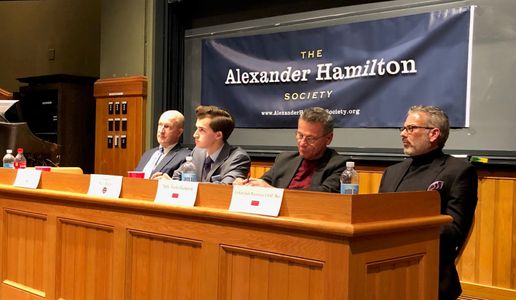Weinstein, Garcevic Speak at Panel on the Future of NATO
USAF (Ret) Lt. Gen. Jack Weinstein, Professor of the Practice of International Security at the Frederick S. Pardee School of Global Studies, and Amb. Vesko Garcevic, Pardee School Professor of the Practice of International Relations, spoke at a November 12, 2019 panel at Harvard University entitled “NATO’S Next 70 Years: Looking to the Transatlantic Future,” hosted by the Harvard Alexander Hamilton Society.
The discussion focused on NATO’s evolving role in the next 70 years and how the United States and Europe should continue to strengthen the transatlantic alliance. Other speakers on the panel included Ian Brzezinski of the Atlantic Council.
Garcevic and Weinstein both commented on President Macron’s statement that “NATO is brain death” and his “wake up” call for Europeans to create “the European true army” capable of protecting the European Union “from China, Russia and even the United States of America.”
Weinstein spoke about the military perspective of NATO and its global posture. He also raised questions regarding the reliability of NATO allies, the strength of the alliance and its purpose today.
Garcevic discussed the issue from the European perspective, examining whether NATO or the EU is in charge of the European security, and whether Europe can create its own army? He also outlined the structural, political and historical impediments to an EU army.
During his diplomatic career, Amb. Vesko Garcevic dealt with issues pertinent to European security and NATO for almost 14 years. In 2004, he was posted in Vienna to serve as Ambassador to Organization for Security and Cooperation in Europe. He had been a Montenegro’s Ambassador to NATO from 2010 until 2014 and served as a Montenegro’s National Coordinator for NATO from 2015 until he joined the faculty at the Pardee School.
USAF (Ret) Lt. Gen. Jack Weinstein, Lieutenant General, USAF, (Ret), served in the U. S. Air Force from 1982 to 2018. Prior to arriving at the Pardee School of Global Studies, he was the Deputy Chief of Staff for Strategic Deterrence and Nuclear Integration, Headquarters United States Air Force, the Pentagon. In this position, he was responsible to the Secretary and Chief of Staff on all aspects of nuclear deterrence operations providing direction, guidance, integration and advocacy regarding the nuclear deterrence mission of the U.S. Air Force and engaged with joint, interagency and NATO for nuclear enterprise solutions.
